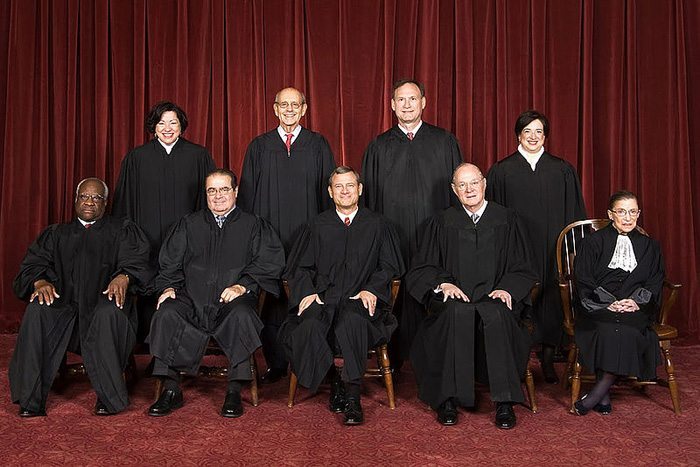Roberts Court Could Act This Week on Marriage Equality Request
A federal appeals court decision is set to take effect this week, unless the Roberts Court grants an emergency request by attorneys for Virginia to stay that decision striking down the state's ban on same-sex marriage.

On Monday, attorneys for the State of Virginia asked the U.S. Supreme Court to stay a federal appeals court decision striking down the state’s ban on same-sex marriage and also urged the Court to take up the fundamental question of whether or not states can ban same-sex marriages, “as quickly as possible.” The request is the latest to land before the Roberts Court after a summer filled with federal court decisions striking same-sex marriage bans in states across the country, including in Virginia, Oklahoma, and Utah, making it all but certain the Court will take up the issue of whether or not states can ban marriages between same-sex couples next term.
The request is one of three filed with the Roberts Court requesting that it consider taking up the Virginia case at its September 29 conference, ahead of the formal opening of the Court’s term in October. Late July, the Fourth Circuit Court of Appeals affirmed a lower court ruling striking down Virginia’s ban on same-sex marriages.
In a separate filing, marriage equality advocates urged the Roberts Court to reject the state’s request but agreed that if the Court decided to grant the stay, it should accept the case for full review promptly. “We will fight these last-ditch desperate attempts to delay the inevitable arrival of the day when same-sex couples can marry in Virginia,” said Jon Davidson, legal director at Lambda Legal, in a statement. “But if the Court grants a stay, we want this issue to be decided as quickly as possible.”
Virginia Attorney General Mark Herring, a Democrat, said in a court filing that he would support delaying gay marriage in the state and granting the stay because he would prefer the Supreme Court take up the case to immediately decide the core issue of whether or not states can ban marriage equality.
The Virginia case is one of at least two cases the Supreme Court could act on to decide the question of whether or not states can constitutionally restrict marriages to the union of one man and one woman. Attorneys defending marriage equality bans in Utah and Oklahoma have also filed petitions asking the Roberts Court to uphold their respective state bans on marriage equality. Other federal appeals courts, including the Sixth Circuit, are expected to issue rulings on state bans in Michigan, Ohio, Kentucky, and Tennessee later this fall. So far only one court, in Tennessee, has ruled against marriage equality; it was a narrow ruling with limited, if any, impact on the state ban challenges currently working their way through the federal courts.
Chief Justice John G. Roberts Jr. handles emergency requests from the Fourth Circuit and can either decide Virginia’s request on his own or refer the matter for the entire Court. The Fourth Circuit’s decision is scheduled to take effect August 21, unless the request filed with the Supreme Court is granted.
